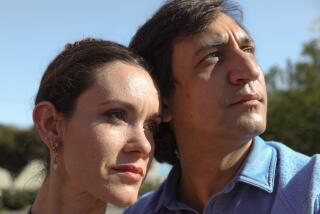‘Baby ballerina’ gained fame at 12 in Paris operetta
- Share via
Irina Baronova, the last of the three “baby ballerinas” whose international careers were launched by choreographer George Balanchine, has died. She was 89.
Baronova died in her sleep Saturday at her home in Byron Bay, New South Wales, Australia, according to the Australian News.
Baronova came to fame at the age of 12 when Balanchine cast her in a 1931 Paris staging of composer Jacques Offenbach’s operetta “Orpheus in the Underworld.” French critic Andre Levinson wrote, “The sensation of the evening was the tiny child Baronova, who went through the final galop like a whirlwind.”
A year later, Balanchine recruited Baronova, Tamara Toumanova, 14, and Tatiana Riabouchinska, 15, to be the stars of a new Ballets Russes de Monte Carlo, successor to the Ballets Russes de Diaghilev.
The three dancers were dubbed the “baby ballerinas” by British critic Arnold Haskell and promoted as such by impresario Sol Hurok for their first U.S. tour in 1933.
“Mr. Hurok liked the concept,” Baronova told the Rocky Mountain News in 1995. “He would always say, ‘It’s good for publicity.’ But I always hated it. I mean, ‘baby ballerina’! Yuck!”
Toumanova died in 1996 in Santa Monica, Riabouchinska in 2000 in Los Angeles.
Baronova, known for her beauty, grandeur and warmth of temperament, danced such classical and Romantic ballets as “The Sleeping Beauty,” “Swan Lake,” “Les Sylphides” and “Coppelia.”
She created roles in Balanchine’s “Cotillon”; Fokine’s “Bluebeard”; Massine’s “Les Presages,” “Jeux d’Enfants” and “Le Beau Danube”; Lichine’s “Helen of Troy”; and Nijinska’s “Les Cent Baisers” and “Les Noces.”
Her stage partners included Serge Lifar and Anton Dolin. In those artistically heady times, Pablo Picasso, Salvador Dali, Juan Miro, Marc Chagall and Henri Matisse often designed sets and costumes for the Ballets Russes.
Baronova was born March 13, 1919, into a wealthy, well-connected family in St. Petersburg, Russia, that fled the country in 1920 after the Bolshevik Revolution. She grew up in the slums of Romania, where at her mother’s insistence she took her first ballet lessons, hanging onto a kitchen table instead of a barre.
“I didn’t enjoy ballet to start with,” she told the Melbourne (Australia) Herald Sun in 2005. “I felt it was a nuisance. I wanted to be climbing trees with my friends. I couldn’t understand what it was all for, but one didn’t argue with my mother. I knew that would end badly for me. I did what I was told.”
When Baronova was 8, the family moved to Paris, where she was able to study with Russian emigre ballerina Olga Preobrajenska. In class, she also met fellow student Tamara Toumanova, began to perform at society tea parties and was spotted by Balanchine.
Based in Paris, the Ballets Russes toured the U.S., Europe, Canada, Mexico and Cuba. In four months, the troupe danced in 125 cities.
Chafing under her mother’s dictatorial rule, however, Baronova eloped with German “Jerry” Sevastianov, associate manager of the Ballets Russes, when she was 17, moving to the American Ballet Theatre when Sevastianov became managing director of that company in 1941. Their relationship was tumultuous, and the marriage lasted only three years.
In 1946, she married British theatrical agent Cecil G. Tennant, whose clients included Clark Gable and Laurence Olivier and his wife, Vivien Leigh, who became close friends of the family.
As a condition of their marriage, Tennant insisted that she give up the stage and not see any of her former ballet colleagues for five years, giving her 48 hours to make up her mind. Baronova complied.
Asked in 2005 by a Sydney, Australia, Morning Herald reporter whether she would have acceded to those conditions if given another chance, she said, “Yes, I would, because I had the most blissful, wonderful 18 years, with the most wonderful husband who made me very happy.
“We had three children, a wonderful home and family life, and that is the end of it all. It was the most precious thing in life. If I had never had children, I would be a miserable old bag by now.”
Their children were Victoria, an actress; Irina; and Robert. Tennant died in a car accident in 1967. She later remarried Sevastianov, who died in 1971.
During her career, Baronova also appeared in several films, including “Florian” (1940) and “Yolanda” (1943), and appeared in musicals and plays, including “Follow the Girls,” “Bullet in the Ballet” with Massine and “Dark Eyes” with Yul Brynner. In 2005, she wrote an autobiography, “Irina: Ballet, Life and Love.”
Baronova moved to Byron Bay in 2000 to be near her daughter Irina. Survivors include her three children, six grandchildren and a great-granddaughter.
--
More to Read
The biggest entertainment stories
Get our big stories about Hollywood, film, television, music, arts, culture and more right in your inbox as soon as they publish.
You may occasionally receive promotional content from the Los Angeles Times.










